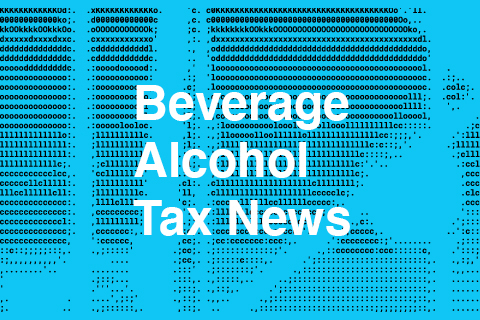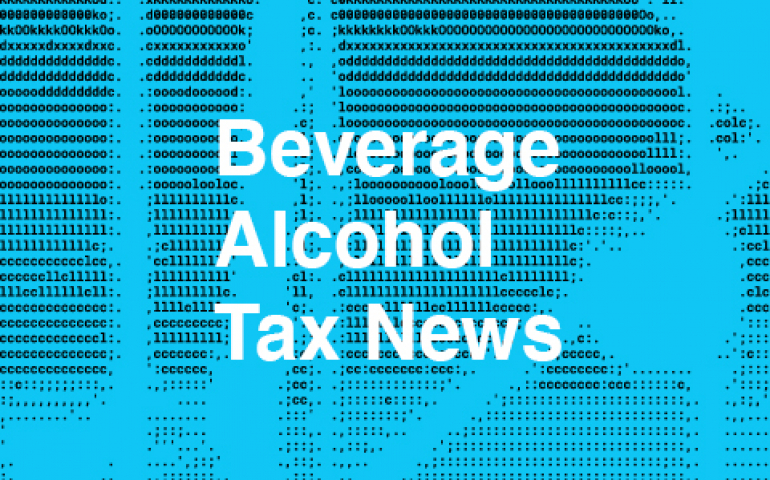Beverage Alcohol Tax News August 2022
New Hampshire: Liquor Manufacturers Allowed Retail Sales of Liquor — June 17, 2022
Effective July 1, 2022, a New Hampshire liquor manufacturer distilling less than 1,000 cases of liquor every year is allowed to sell liquor for off-premises consumption on its licensed premises. The annual license fee is $300, and it allows retail sale of up to 9 liters case per customer and not more than 12 9-liter of liquor per customer every calendar year.
Minnesota: Liquor Regulations Announced — June 3, 2022
A distilled spirits' manufacturer in Minnesota is allowed to sell cocktails to the public. But the distilled spirits' manufacturer may not conduct sales for off-sales or operate a cocktail room until licensee's at least 50% of annual production is processed and distilled on licensed premises.
Louisiana: Various Changes Effective For 2022 — June 15, 2022
A brewer operating a brewing facility in Louisiana who annually produces less than 5,000 barrels of beer or other malt beverages and holding a brewer's self distribution permit and in-state manufacturer's permit can self-distribute to a retailer who holds a class A, class B or class C permit.
Effective August 1, 2022, a licensed wholesaler is allowed to transfer from a Louisiana microbrewery to another microbrewery up to 50% of the total manufactured beverages sold at the receiving microbrewery, provided the following conditions are met:
- The receiving microbrewery should be completely owned by the permitted microbrewery which brews the manufactured beverages allowed for transfer.
- The receiving microbrewery should have at least a 10 barrel brewing system.
- The microbrewery who transfers the manufactured beverages is responsible for paying the accompanying federal, state and local excise taxes applicable on transferred manufactured beverages.
- Only one microbrewery within the same municipality is allowed to receive the transfer of manufactured beverages.
Starting June 17, 2022, a Louisiana based licensed manufacturer or brewer is allowed to lease its facility to a third party for up to 12 contracted events per year during which alcoholic beverage and food not produced at the licensed facility can be served to the guests by a caterer holding a permit under the following conditions:
- A copy of the lease should be submitted to the commissioner at least 10 days in advance.
- The brewer or manufacturer can charge a rental fee to the third party for the event.
- The brewer or manufacturer can serve the beer manufactured at his facility to all the guests.
Mississippi: Sales Tax on Alcohol Beverages Repealed — June 2, 2022
Effective July 1, 2022, the sales tax on the wholesale purchase of alcoholic beverages purchased within the state of Mississippi has been repealed. This is applicable to all ABC permit holders carrying out wholesale purchases or sales of alcoholic beverages.
Connecticut: Various Liquor Industry Changes — June 3, 2022
A festival permit allows a festival sponsor to arrange a festival in Connecticut and costs $75. On festival sponsor's invitation, eligible manufacturers can participate in the festival offering festival visitors paid or free samples of alcoholic liquor which it manufacturers for on premises consumption. Moreover, under specific circumstances, a participating manufacturer may:
- Sell and directly ship alcoholic liquor sold at the festival to festival visitors;
- Sell, at retail, bottles of liquor and other sealed liquor containers for off-premises consumption;
- Sell, at retail, liquor by glass for on-premises consumption.
Iowa: Various changes Effective for 2023 — July 15, 2022
Effective January 1, 2023, the following changes to alcoholic beverage licensing are enacted:
Any class B, class C, special class C or class E retail alcohol licensee is allowed to sell wine and beer to consumers at retail for off-premises consumption. These sales should be carried out in original containers and every class B, class C, special class C and class E retail alcohol licensee who is doing business in more than one location where wine and beer is sold is needed to have separate license for each business location, except as otherwise mentioned.
The annual manufacturer fees will change for the following manufacturers:
- A distiller's certificate of compliance will be $200 (currently, $50);
- A brewer's certificate of compliance will be $200 (currently, $500);
- A vintner's certificate of compliance will be $200 (currently, $100);
- A manufacturer's license will be $300 (currently, $350); and
- A class "A" native distilled spirits license for a native distillery will be $300 (currently, $500).
Alcohol Content
The minimum alcohol content in a canned cocktail is reduced from 6.25% to 0.5% alcohol by volume. The maximum alcohol content remains the same at 15% alcohol by volume.
For high alcoholic content beer, the maximum alcohol content increased from 15% to 19%. The minimum alcohol content is the same at 0.25% alcohol by volume.
New Hampshire: Various Liquor Industry Changes — July 25, 2022
Starting August 2023, the following changes are effective in New Hampshire:
- Licensed carriers in New Hampshire are not allowed to transport any wine, liquor or beverage from a person who does not have a direct shipper permit.
- Beer festival licenses in New Hampshire are renamed as beer and specialty beverage festival licenses. These new licenses cover beverages, specialty beverages and specialty beer and the holder of this license is allowed to organize, hold and advertise an event not exceeding 3 days duration, promoting alcohol beverage products.
Michigan: Liquor Industry Developments — July 22, 2022
Starting October 5, 2022, and on 1st of July each year thereafter, a small distiller in Michigan or an out-of-state entity equivalent to a small distiller must file an application with the agriculture and rural development department to be certified as a qualified small distiller, at a reasonable certification fee. The department has to certify that the applicant is a verified small distiller by determining if the base distillate of the small distiller is at least 40% distilled from qualified grain grown and harvested in Michigan. The certificate expires on July 1 following the date of issuance.
Effective January 1, 2023, a gross profit of 32.5% should be returned to the Liquor Control Commission for the price of each bottle of qualified distilled spirit manufactured by the small distiller.
Mostly, a Michigan licensee is not allowed a machine that dispenses alcoholic liquor directly on the licensed premises to a customer. However, a dispensing machine can be located:
- In a suite or bedroom of a hotel of class A or class B hotel licensee;
- At on-premised licensed establishments provided specific conditions are met.
Arizona: Certain Retail License Amendments — July 13, 2022
A person who controls more than one microbrewery in Arizona is allowed to conduct remote retail operations from a microbrewery provided the microbrewery hold an on-sale retail license for a restaurant, bar or beer and wine bar.
The state of Arizona repealed a provision that prohibited a retailers license issuance to a premise that is located within 300 horizontal feet of a church.
Alaska: Alcoholic Beverage Licenses and Permit Provisions Approved — July 8, 2022
Beginning January 1, 2024, the following biennial manufacturer license fee in Alaska will be increased:
- Brewery manufacturer license: $1,250 (currently, $1,000).
- Winery manufacturer license: $1,000 (currently, $500).
- Distillery manufacturer license: $1,250 (currently, $1,000).
Beginning January 1, 2024, the additional annual fees for an Alaska general wholesale license and limited wholesale brewed wine and beverage license will be reduced. This fee is based on the total value of business transacted by the wholesale business including the excise tax during a calendar year.






